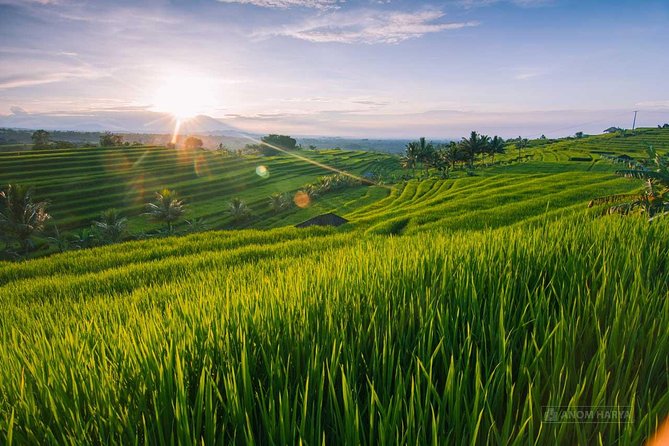Seminyak Trip Overview
This tour is one of the best-selling tourists visits, as they will see how beautiful the rice fields in Bali especially in Tabanan District.
Additional Info
Duration: 8 to 9 hours
Starts: Seminyak, Indonesia
Trip Category: Tours & Sightseeing >> Bus & Minivan Tours
Explore Seminyak Promoted Experiences
What to Expect When Visiting Seminyak, Kuta District, Indonesia
This tour is one of the best-selling tourists visits, as they will see how beautiful the rice fields in Bali especially in Tabanan District.
Itinerary
This is a typical itinerary for this product
Stop At: Jatiluwih Green Land, Jatiluwih Village, Tabanan 82152 Indonesia
Jatiluwih rice terrace Bali located at the center of Tabanan regency. Now have named as one of Bali Cultural Landscape by UNESCO as a part of Balinese Subak System. By most traveler who has visited Jatiluwih Tabanan Bali, knows Jatiluwih Bali as a large area of countryside. Most of the entire hill area occupied with green rice paddies shape as a terrace. The rice terrace stretch from the top of the mountains until the land meets the sea. Jatiluwih rice terrace for some travelers calls with a different name, which is Jatiluwih Green Land.
Duration: 2 hours
Stop At: Bali Butterfly Park, Jl. Batukaru Br. Sandan Lebah. Kel.Sesandan, Tabanan 80351 Indonesia
Coming to this place, children can learn many things. Moreover, they can also directly witness the beauty of nature with the living creatures that live in it. Especially in this place, tourists can not only look at the beauty of various types of butterflies, but can also have the opportunity to see the process of metamorphosis from caterpillars to cocoons and subsequently turned into beautiful butterflies.
Duration: 30 minutes
Stop At: Taman Ayun Temple, Jl. Ayodya No.10, Mengwi 80351 Indonesia
Taman Ayun Temple is situated in Mengwi Village of Badung District, around 18 km to the west of Denpasar. It is a very beautiful temple, as the name tells (Taman Ayun means temple in a beautiful garden). In addition to its beauty, Taman Ayun Temple is also considered to have historical values, which makes the regional government of Bali suggests the UNESCO in 2002 that this temple is included in World Heritage List.
Taman Ayun Temple is a Mother Temple (Paibon) to Mengwi Kingdom. This temple was built by Mengwi King, I Gusti Agung Putu, in the Javanese year of 1556 (1634 AD). Initially, I Gusti Agung Putu built a temple to the north of Mengwi village to the worship of his ancestors. The temple was named Genter Park. When Mengwi grew into a big kingdom, I Gusti Agung Putu moved Genter Park eastward and expand the compound. The expanded temple was officially declared Taman Ayun Temple on Kliwon Tuesday – Medangsia the fourth month in the Javanese year of 1556. Until today, each Kliwon Tuesday of wuku Medangsia in Javanese calendar (Saka), a piodalan (ceremony) is held in this temple to celebrate the temple’s anniversary.
Duration: 30 minutes
Stop At: Jatiharum Luwak Coffee Plantation, Tabanan Bali, Penebel 82152 Indonesia
Would you drink coffee made from poop? Yes, I said it ladies, poop. The world’s most expensive and exclusive coffee in the world is made from just that, poop. On my trip to Bali, Indonesia, I ventured to the legendary Luwak Coffee Plantation. Here I participated in a step-by-step tour of how this specialty coffee is produced and then enjoyed a coffee tasting overlooking lush jungle terrain. A bit skeptical at first, I was blown away by learning about the intense craft and precise art of poop that is required in the curation of the world’s must delicious coffee.
THE MAKING OF LUWAK COFFEE
Kopi luwak is the world’s most expensive coffee. The main factor of it’s high price is the uncommon method of producing such a coffee. This coffee is produced from the coffee beans which have been digested by a certain Indonesian cat-like animal called then palm civet or also civet cat. This is the reason kopi luwak is often called “cat poop” coffee.
Coffee beans are actually seeds found in the pit of cherry-sized fruits on the coffee plant. Removing these seeds in the preparation of coffee can be done through fermentation. Over the years humans have devised several ways to synthesize that process of fermentation. But fermentation also happens naturally in the wild through an animal’s digestive tract. Here at the Coffee Plantation, the civet cat eats the ripest berries of a coffee plant and through the process of digestion, the seed is separated from the fruit and is fermented. After about 24 hours, the cat will poop the seeds out naturally and voila… the magic in the coffee making process begins.
Following the collection of the cat’s waste, the beans are carefully washed, dried, pounded and finally, roasted over an open-fire. Some coffee connoisseurs say that the natural process of fermentation leaves the final cup of coffee tasting much smoother and less acidic than any other coffee. I wanted to try for myself, so I eagerly requested to participate in a tasting.
FROM CATS TO THE COFFEE TASTING
The tour provided a step-by-step overview of the coffee making process and even allowed for the opportunity to visit with the famous “coffee cats“. They were a bit scary looking – a mix between a possum, cat and rat. But despite their strange appearance, I was impressed with how much these animals cuddled with one another – I caught one pair of cats aggressively spooning and assumed they must be husband and wife, or perhaps friends with benefits?
At the end of the tour we were guided to a beautiful table overlooking a picturesque backdrop of green tiered rice terraces and palm trees. It was absolutely beautiful. The friendly Balinese staff provided us with a generous sampling of specialty teas and coffees, including the famous Luwak coffee. I first tried the lemon grass tea and was amazed with the zesty, fresh flavor and hints of ginger. As a chocolate lover, the mocha coffee was as sweet and rich as can be.
But the Luwak coffee, the world renown poop coffee, was the smoothest cup of coffee I have ever tasted in my life. With a subtle taste of caffeine, the coffee had a very unique and relaxing aroma to it. Perhaps it was the poop effect? Regardless, I left impressed with the Luwak coffee. I now know why this cup of specialty coffee costs $50 a cup in New York City! For more information on my insider experience tasting Luwak coffee in Bali, see below for personal photographs. Be sure to put this hotspot and tour on your list when in Bali, Indonesia. You just can’t experience Bali without a taste of poop, oops I meant Luwak
Duration: 30 minutes






